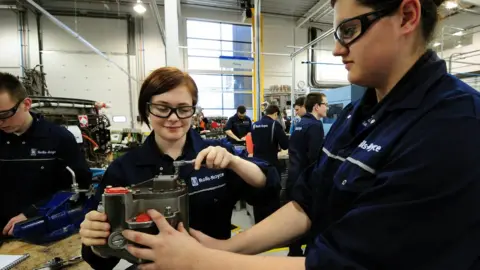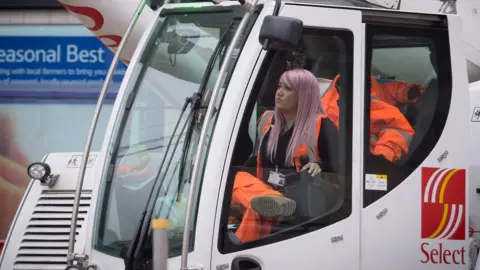Apprenticeship take-up down by a quarter
 PA
PAThe number of people starting a training programme has fallen "substantially" under the government's new apprenticeship scheme, according to the National Audit Office (NAO).
The public spending watchdog said the government was "very unlikely" to hit a 2020 target of 3 million new starts.
The government had some way to go before it showed the scheme was value for money, the NAO added.
The government said the apprenticeship numbers were now rising year on year.
Apprenticeship and Skills Minister Anne Milton said the government would continue to work with employers to help them develop their apprenticeship programmes.
The government radically changed the apprenticeship system in 2017, introducing a levy or tax on large employers which they can then claim back to fund training.
Smaller firms have had to pay more towards training and the suppliers of courses changed.
But rather than boosting the number of apprenticeships, they have fallen by a more than a quarter with many small firms giving up on schemes and larger ones failing to even claim back the money they paid in, leaving £2bn unspent.
Many larger firms regard the apprenticeship levy as little more than an extra tax on their wage bill, while many smaller companies are reluctant to have their apprentices go to college one day a week.
As a result, just when the government is trying to boost the number of people taking apprenticeships and with many students only too keen to be paid to study, rather than running up student debts at college or university, the number starting apprenticeships has slumped.
Just before the new scheme was introduced there were 509,400 starts a year; last year there were just 375,800, a fall of 26%.
Also, there has been a decline in the lower-level apprenticeships and a rise in the higher, degree equivalent ones.
This suggests many companies are abandoning apprenticeships aimed at many school leavers with weaker exam results.
'Much more to do'
As a result, the head of the NAO, Amyas Morse, said that the Department for Education (DfE) was very unlikely to achieve its target of creating 3 million new apprentices by 2020. In fact, it would have to double the number starting new apprenticeships to stand any chance of hitting that target.
"Despite making changes to the apprenticeships programme, the department has not enticed employers to use available funds or encouraged enough potential recruits to start an apprenticeship.
"It has much more to do to meet its ambitions. If the department is serious about boosting the country's productivity, it needs to set out clearly whether its efforts are on track to meet that aim," he added.
 Getty Images
Getty ImagesThe CBI's chief UK policy director, Matthew Fell, said: "Today's report confirms what employers already know - that the apprenticeship levy is not yet working as intended and is holding back the government's welcome efforts to modernise the skills system.
"Companies are committed to apprenticeships, so what's needed now is a second wave of reform."
However, Ms Milton said: "The number of people starting training on our new employer-designed standards is rising year-on-year, and we will continue to work with employers to help them develop their apprenticeship programmes."